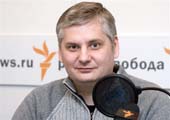Russian and Georgian experts discuss relations between the two countries
By Temuri Kiguradze
Monday, July 13

The main accent of the discussion was on the role of Georgia as the focal point of the clash between global politics’ main players – the USA and Russia. Talking about Russia’s recognition of Georgian breakaway regions Abkhazia and South Ossetia as ‘independent states’ after the August war, Akaki Asatiani, leader of the opposition Georgian Traditionalists’ Union, stated that Russia had recognised these regions “to spite” the US after its recognition of Kosovo.
“Of course new realities were created [after this], however the past is still here,” stated Asatiani, adding that if relations between Georgia and Russia are not improved “there will be a new generation of people who consider our countries sworn enemies.”
Soso Tsintsadze, a Georgian political expert and the head of the Diplomatic Academy in Tbilisi, noted that “Neither the Georgian people nor any Georgian leader, no matter who comes to power, will ever agree to recognise the independence of Abkhazia and South Ossetia. No one [in Georgia] will ever tolerate the fact that there are three Ambassadors [of Russia] in Georgia – in Sokhumi, Tskhinvali and Tbilisi,” underlined Tsintsadze.
Russian political analyst Sergey Markedonov, who heads the Department of International Relations at the Russian Institute of Political and Military Analysis, spoke about ways of bringing the positions of Georgia and Russia together. “Never say never,” stated Markedonov in response to Soso Tsintsadze. “If we talk about the improving of relations in the long or mid-term perspective we can consider the radical Islamic movements gaining power in the North Caucasus. Georgia has already had to deal with this kind of problem in Pankisi Gorge,” stated Markedonov. The Russian expert also noted that Tbilisi falsely hoped for the support of the USA in resolving the crisis in the South Caucasus.
“The question of what Georgia will be like in future and how close it will move towards finding a common language with its territories that Moscow has recognised as independent countries will depend on the attitude of Tbilisi to Abkhazia and South Ossetia. The fact that Obama will support Georgia’s territorial integrity 25 times will not make it a united state. Despite all its importance for the South Caucasus Georgia is not the number one issue in Russian-American relations,” said Markedonov.
In response to The Messenger’s question on the possibility of further military action against Georgia this year, Sergey Markedonov said that the military exercises on Georgia’s border shouldn’t be regarded as preparation for war just because the August 2008 war started after similar trainings had been held. “The August conflict was a product of trends over the last four years and not those military exercises. It’s silly to say that Russia will try to take Tbilisi. Likewise Georgia has no power to attack because now it is in a much worse position [than it was in 2008] as it doesn’t have control over the Abkhazian Kodori Gorge and the Akhalgori district [in South Ossetia]. However I don’t exclude minor provocations taking place this summer,” concluded the expert.
